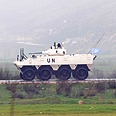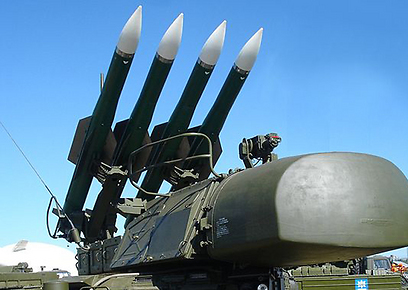
Officials to AP: Israel hit SA-17 missiles shipment
News agency quotes US and regional security officials as saying Israel conducted airstrike inside Syria hitting convoy of trucks; officials estimate target was SA-17 missiles which would be 'game-changing' in hands of Hezbollah
The regional officials said Israel had been planning in the days leading up to the airstrike to hit a shipment of weapons bound for Hezbollah in Lebanon. They said the shipment included sophisticated, Russian-made SA-17 anti-aircraft missiles, which would be strategically "game-changing" in the hands of Hezbollah.
Related stories:
- 'Israel hit target on Syria-Lebanon border'
- Study: Iran, Hezbollah terror threat rising
- Blast reported at Hezbollah weapons depot
A US official said the strike hit a convoy of trucks.
SA-17 missiles are self-propelled and have the capacity to hit jets at a low altitude. The system's portability makes it harder to trace and enables it to surprise jets within its range. These attributes could jeopardize IAF jets should they operate against Hezbollah in Lebanon.

SA-17 missiles
A former senior security official in Lebanon told the Washington Post that the attack involved a missile fired by an unmanned Israel aircraft at a truck the Lebanon-Syria border. There were no casualties, according to him. The strike was on the Syrian side of the border, said the former official, who still has close ties to Lebanon’s senior security team and said he was told about the attack by a high-ranking official.
He said the truck was carrying weapons, although it was unclear what kind of weapons. It also was not immediately clear whether the truck was being used by the Syrian military or by Syrian rebel forces, who have been locked in a brutal, bloody civil conflict for almost two years.
Earlier on Wednesday, foreign and Arab media sources said Israeli forces attacked a target on the Syrian-Lebanese border overnight adding that 12 IAF jets breached Lebanon's airspace on Tuesday.
The US-based Al-Monitor website quoted Lebanese sources as saying the target was a weapons convoy traveling near Syria’s border with Lebanon. The report has not been corroborated by any Israeli source and the IDF refused to comment on the matter.
If Israel indeed conducted an airstrike, it may have been signaling to Bashar Assad that Jerusalem would not tolerate the transfer of weapons to Hezbollah. It is likely Syria is not interested in locking itself into a conflict with Israel for fear it would cause the Assad regime to collapse. Israel on its part, is not interested in engaging Hezbollah either.
Analysts estimate that Assad's regime has a clear interest in transferring advanced "game-changing" weapons to Hezbollah in order to repay it for its assistance in Syria's war against the rebels and to prevent the weapons from falling into rebels' hands.
Hezbollah in turn could use the long-range Scud-D missiles to threaten Israel's hinterland and defend itself against an Israeli airstrike.
On Tuesday, the World Tribune reported that Israel's intelligence community has been tracking convoys of trucks that were bringing what appeared to be missiles and warheads from Syria’s Latakia region to Lebanon. Officials said the convoys were unloading the suspected weapons at Hezbollah warehouses in Lebanon’s Bekaa Valley.
"When we said we mustn’t let terrorists lay a hand on Syrian weapon, we meant it," Former Mossad Chief Danny Yatom told Ynet Wednesday.
According to Yatom, if foreign reports of an Israeli attack near the Syrian-Lebanese border are true, it means that Israel had a clear indication that Hezbollah had crossed a line.
Various Israeli sources spoke out recently, insisting that Israel would do anything to stop ammunition owned by Assad forces from making its way into the hands of terror organizations.
"Some things are casus belli," Yatom said; "That would be the red line that we drew and Israel would be right to do anything it can to enforce it."
Yatom addressed the possibility that Syria or Hezbollah would respond to the alleged attack, if said attack indeed happened, saying "I estimate that no such response will occur, since neither Hezbollah nor the Syrians have a motive to respond – Assad is preoccupied with his own affairs and Hezbollah is fully engaged in the effort to assist him, so they wouldn’t want to fight an even greater war."
Ron Ben-Yishai, AP, Roi Mandel and Nir Cohen contributed to this report
- Receive Ynetnews updates directly to your desktop










